Explore the practices of others implementing the Global Compact for Migration (GCM) and submit your own practice.
Learn about the support available to UN country teams, government and stakeholders, and access training and guidance materials on GCM implementation.
After joining the Hub, submit your content related to implementing the Global Compact for Migration here. Your submission will be peer reviewed.

Map showing the number of Practices published to date. All Practices undergo peer review before publication.
Latest content
Oceania
Asia
Africa
Europe
Featured content
More GCM-relevant platforms
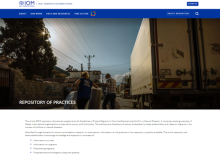 International Organization for Migration (IOM)
International Organization for Migration (IOM)The online MICIC repository of practices supplements the Guidelines to Protect Migrants in Countries...
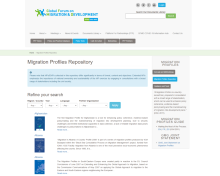 Global Forum on Migration and Development (GFMD)
Global Forum on Migration and Development (GFMD)Migration Profiles are frameworks for aggregating, in a structured and systematic manner, existing...
 International Organization for Migration (IOM)
International Organization for Migration (IOM)IOM's Counter Trafficking in Emergencies (CTIE) portal includes a resources section with access to...
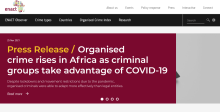 Institute for Security Studies (ISS), INTERPOL, Global Initiative Against Transnational Organized Crime
Institute for Security Studies (ISS), INTERPOL, Global Initiative Against Transnational Organized CrimeENACT (Enhancing Africa’s Response to Transnational Organised Crime) works to mitigate the impact of...
 International Organization for Migration (IOM)
International Organization for Migration (IOM)The Migration Data Portal aims to serve as a unique access point to timely, comprehensive migration...
 KNOMAD
KNOMADThe Global Knowledge Partnership on Migration and Development (KNOMAD) is a global hub of knowledge...
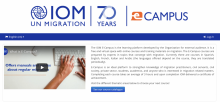 International Organization for Migration (IOM)
International Organization for Migration (IOM)The IOM e-Campus is a free learning platform with online courses and training materials on migration...
HUB Events
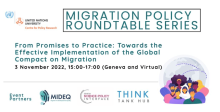 United Nations University Centre for Policy Research - UNU-CPROnline | Public-
United Nations University Centre for Policy Research - UNU-CPROnline | Public- United NationsPublic-
United NationsPublic-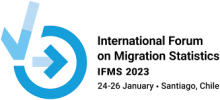 UNDESA, OECD, International Organization for Migration (IOM)-
UNDESA, OECD, International Organization for Migration (IOM)-
*References to Kosovo shall be understood to be in the context of United Nations Security Council resolution 1244 (1999).
Newsletter
Subscribe to our newsletter.


